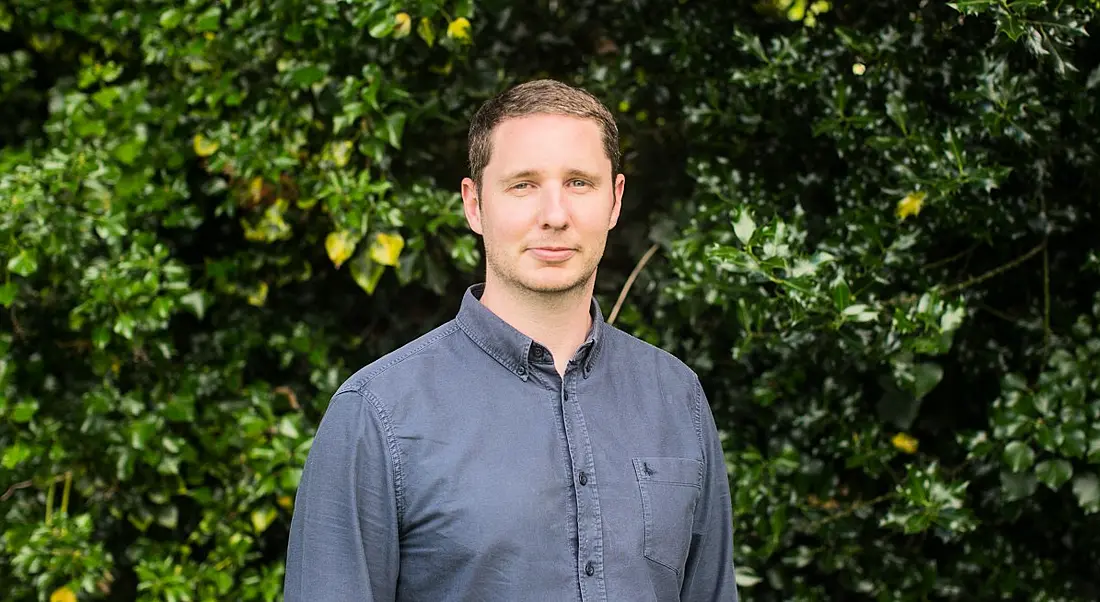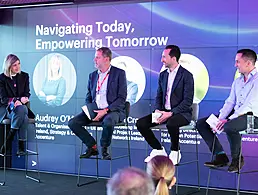Accenture’s Andrew Poole talks about the analytics projects he works on and why communication is the key to success.
Andrew Poole is a principal data scientist working at The Dock, Accenture’s flagship R&D and global innovation centre based in Dublin.
Poole has been working as a data scientist for more than five years and has experience across a diverse range of data-related problems in various industries including utilities, pharmaceutical, security and transport.
‘The hardest part of working in analytics is also the reason I wanted to work in this field’
– ANDREW POOLE
If there is such a thing, can you describe a typical day in the job?
Typically, I start my day around 8.30am. This gives me time in the morning to see how we are progressing on tasks generally, plan out the day ahead and reply to any emails that came in overnight. Most projects work in two-week sprints and stand-ups (regular check-ins with the team) usually occur around 9.30am.
The nature of working in an R&D facility lends itself to not really having a typical day. The number of meetings is highly dependent on the phase of a project. Early project phases usually have a lot more meetings. This is when the various disciplines that work in The Dock come together to brainstorm about the client’s needs and consider the best solution for them.
It is always interesting to hear the various perspectives and how those with different skills backgrounds can think about a problem. This phase of the project can be enjoyable because I get the chance to research new areas and methods.
In the later phases of project, there are far fewer meetings and those that do occur are typically more development focused. I try to structure my day by blocking out time to assist junior data scientists, focus time for my sprint tasks and review other requests. For me, remote working has really improved this phase of a project versus being in the office where it can be more difficult to have focused time.
At the end of each day, around 5.30pm, I make sure to set some time aside to do two things. The first is to write a note about what I was working on that day and what I still need to do. I find this helps me to quickly get back into the task the following day. The last thing I do is deal with any emails left in my inbox. Once this is done, I feel I can sign off mentally from work.
What types of analytics project do you work on?
The project work that generally comes to us are those that typically require the development of a novel solution that leverages state-of-the-art innovation. It is very rewarding to work on these types of projects because you really have to challenge yourself to come up with a solution that no one else has and which can leverage existing client data in a new way.
I have worked with many different types of data in fields such as computer vision, NLP, data mining and time series analysis. The most enjoyable for me have been those that have a computer vision element because I get to use both my engineering and analytical skills.
Working with a pharmaceutical manufacturing client, for example, we were tasked with developing a vial inspection solution that would help them reduce the number of false positives they were having with their current solution. Before Andrew Ng (co-founder of Google Brain) popularised the data-centric AI approach, this project really brought to life some of these lessons that are being emphasised today.
What analytics skills do you use on a daily basis?
Communication is key to the success of every project. Many of us have had the challenge of collaborating in a hybrid work setting over the past couple of years. For any data scientist, it is vital to learn how to both communicate with those from different skills backgrounds and to understand how to deliver your message to a client so that they understand the value to the project.
How to communicate at the right level of detail is always a challenge because one day I could be expected to present at a technical community meeting, and the next I could be asked to deliver on the same solution but to a stakeholder more interested in high-level updates.
In a previous life, I worked in a financial role and I find this experience has served me wonders because I can also assess any solution with another hat. As data scientists, we must always ask ourselves, ‘Is the solution we are proposing realistic in a business context?’
Technically, I am always looking to learn something new, be it a different area of analytics, a new cloud service, a new programming language or paradigm. Technical skills are like any other – I find if you don’t constantly exercise them and challenge yourself, you can quickly fall behind.
What are the hardest parts of working in analytics?
The hardest part of working in analytics is also the reason I wanted to work in this field. You could never know everything there is to know because analytics spans many different disciplines and is always evolving.
Continuous learning is something I really enjoy. I try to dedicate some personal time each week to learning new things. As my personal life responsibilities grow, it can be more difficult to find these pockets of time to dedicate to learning.
However, I am lucky to work for a company that encourages knowledge-sharing meetings. There is always someone putting together a community session to teach others what they have learnt.
Do you have any productivity tips that help you through the day?
As I grow older, my memory seems to hold onto less and less. I recently got into using an app called Notion to track what tasks I am working on. This has helped me to focus more on what I am currently doing and being able to set other things aside for later.
A good productivity tip I got from someone I previously worked with is to spot when the number of meetings is starting to disrupt work, and to put in place for my team a defined ‘quiet time’ where no one can put meetings in the diary.
Another thing I do, which is probably the most beneficial for my own productivity, is to get out for a run either before work or during lunch. I find it clears my mind and I can do my best thinking when there aren’t any distractions.
What skills and tools are you using to communicate daily with your colleagues?
I would consider myself as quite a technical data scientist, but as I have progressed in my career there is a greater focus on applying my communication skills to ensure the goals of the project are being met and to present outcomes to various stakeholders.
Primarily, we have hybrid meetings through Microsoft Teams. For most projects, we use Azure DevOps to plan and track our sprints. Having our stand-up meetings through Microsoft Teams and sharing the board has worked really well.
When we are all in the office, we are lucky enough to have several Surface Hubs throughout the building. I am quite a visual communicator, so it is useful to be able to collaborate with my team with the use of this whiteboard functionality.
How has this role changed as the analytics sector has grown and evolved?
I am glad to see that there is far greater emphasis on machine learning operations. In the past, most of the focus in a data science project was on research and an initial model that works well on a test set.
Over the past couple of years, we have seen numerous tools being introduced to help put in place a set of practices that can help deploy and maintain models in production. A key metric for me of whether a project is a success is if it can continue to be maintained in production.
What do you enjoy most about working in analytics?
The most enjoyable part of working in analytics is getting to work in so many different domains. It is a difficult career to get bored with when you are constantly being challenged to understand so many different areas.
Since I have started working in The Dock, I have had the opportunity to work on such a variety of projects such as drug discovery, intelligent transport systems and manufacturing QA, to name a few.
I also enjoy getting to be involved in all aspects of a project. I am able to put on my business hat when getting to understand a client’s needs and communicating with stakeholders. This is where a lot of shape is being put on the work that will be done.
I then get to use my research skills to understand what is possible in the space we are exploring. This is often done in tandem with other skillsets, so we can come together on what the solution should look like.
Finally, I get to use a lot of my technical skills when we get into the development stage of work.
What advice would you give to someone who wants to work in analytics?
It is simple for me. The best advice I can give is to have a curious mindset and to always look to learn new things.
If you are someone that is constantly thinking about how things work, spotting inefficiencies or better ways to do things, then I think you will have a very successful career in analytics.
10 things you need to know direct to your inbox every weekday. Sign up for the Daily Brief, Silicon Republic’s digest of essential sci-tech news.




